Former NFL star raises awareness of breast cancer in men
Not just a woman’s disease


Ernie Green, 75, was a force to be reckoned with on the football field. He played seven seasons for the Cleveland Browns, and has two Pro Bowl appearances under his belt.
But eight years ago he had to reckon with a force that had nothing to do with football — breast cancer. He now has a clean bill of health but that was after surgery, eight rounds of chemotherapy and several years of tamoxifen to decrease the risk of recurrence.
He laughs as he describes his yearly follow-up mammograms. Most men in the waiting room are there to support their wives, while Green is there patiently waiting his turn. The technicians have to clear the way for him before he goes back to avoid exposure of women in various stages of undress.
He admitted that he knew that men could get breast cancer. Richard Roundtree, the actor who played the detective Shaft in three movies, was very vocal about his experience with the disease. But Green saw breast cancer a little closer to home. Two of his sisters as well as two first cousins had breast cancer. But despite the apparent genetic link, he reasoned it could not happen to him. “I was an athlete and took care of myself,” he explained. “I was doing all the right things and I wasn’t going to worry about it.”
So much for being macho.
By far, breast cancer is considered a woman’s disease, but men are not exempt. Misperception is a big part of the problem. Men do not realize they have breasts. Actually, both males and females are born with breasts, but they grow and develop differently. At puberty, while female hormones spur the growth of the mammary gland, male hormones stem its growth. Yet, the basic anatomy remains similar. All breasts have ducts — the most common site of cancer in both men and women
According to the American Cancer Society, about 2,240 new cases of breast cancer in men are expected in 2013 and an estimated 410 deaths. Experts at one time thought breast cancer in men was more deadly than the disease in women. Recently, it was discovered that survival rates are similar. The issue is that men are not looking or checking for breast cancer and once discovered, it is at an advanced stage when survival is lower.
A study published in the Journal of Clinical Oncology in 2007, however, determined that, like breast cancer in women, black men die at a rate higher than white men.
Certain factors increase the risk of breast cancer in men. It is most common between the ages of 60 and 70. Men who have a close family member with breast cancer have a greater chance of developing the disease. Those exposed to radiation or those born with a genetic defect that limits the production of male hormones are targets. Estrogen, the female hormone, impacts men as well. Men with liver disease may have lower male hormones and increased female hormones.
As in women, obesity plays a part. Fat cells in males convert a male hormone into estrogen, thereby exposing men to a greater risk of estrogen-fuelled breast cancer. Green knew something was wrong in July 2005 when he noticed a lump in his right breast. “Initially, I didn’t think it was anything,” he said. “The last thing I thought about was breast cancer.”
That’s when his wife, Della, stepped in. He immediately saw a doctor, who assumed it was a cyst. The doctor explained to Green that in his 37 years of practice, he had never had a male patient with breast cancer.
Green took it one step further. It’s a good thing he did. The next doctor was not so cavalier. “It could be a cyst,” he said, “but it should not be there.” He recommended surgery to take a better look at it.
Green remembers the day well. When he woke up from surgery, the doctor was standing over him with a look on his face that spelled trouble. “I have good news and bad news,” his surgeon said. The good news was that they got “it” all; the bad news was that the “it” was cancer.
Green said he fell apart. “I was never afraid of dying from football,” he said. “But I knew that people died of breast cancer.” One of his sisters had already succumbed to the disease.
The news wasn’t all that bad. His breast cancer was stage I, which meant that cancer cells had invaded surrounding breast tissue but had not reached the lymph nodes.
Green said his eight sessions of chemotherapy were harsh and implied that getting beaten up on the football field was a walk in the park in comparison. He is not embarrassed to discuss his breast cancer; nor does he see it as a threat to his manhood.
As a matter of fact, it’s the exact opposite. He’s on a mission. He made a vow that if he could get through his treatment he would “come out” and let men know about this problem.
Green imparts words of wisdom to all men. “Do breast self-examinations,” he advised, and “demand that a doctor examine your breasts as well.”
He emphasizes the importance of knowing your family tree and to look at both parents for a history of breast cancer. The genetic link can come from one’s mother or father. “And don’t look at just your parents,” he advised. “Find out the history of aunts and uncles and first cousins.”
Green says he will keep on preaching. He has to. An elderly woman approached him and confessed that her husband died of breast cancer because he refused to seek treatment. Green said he wants to make sure these scenarios are not repeated. “There’s no need to get to stage III or IV if we are vigilant,” he said.
An unexpected result of his cancer is increased empathy. “I’m more sensitive to women’s issues,” he explained.
And that must make Della very happy.






